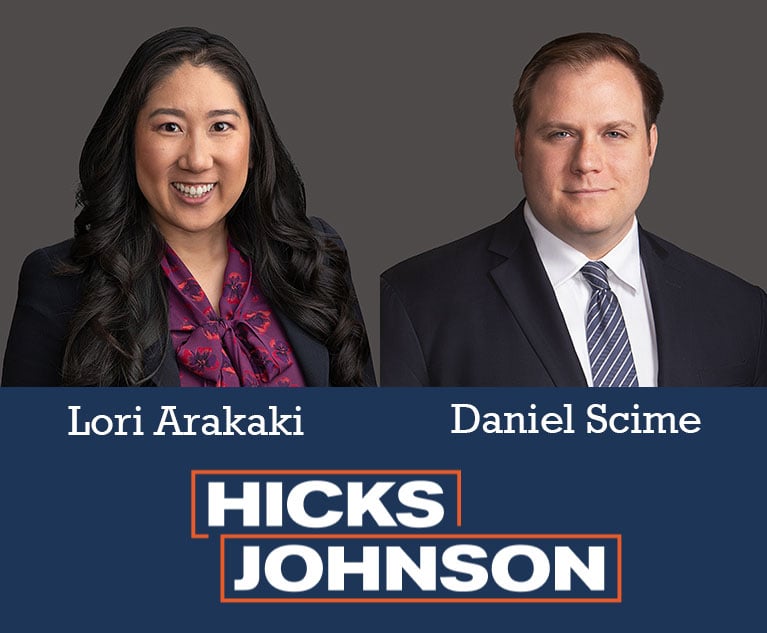19. The Relationship Is Also About the End of the Project
Once a matter is over, it's tempting to move on quickly. But now is the time to capture learnings and best practices.
April 27, 2021 at 08:57 AM
4 minute read
The original version of this story was published on Lean Adviser
Once a matter is over, it's tempting to move on quickly. But now is the time to capture learnings and best practices. As we noted in our last lesson, your clients participate daily in debriefs and post-mortems when it comes to company initiatives and products. Where is their law firm when it comes to these learning discussions about investments the company makes–legal engagements?
The Improvement Stage is about improving you. Welcome to the biggest room in the world, the room to improve.
We focus on improvement of the performance of stakeholders rather than the project. This is why the components of the Improvement Stage are reconciliation, listening and learning. If we can do those three things carefully, then the resulting improvement isn't confined to the project. It is deeper than that. If individual lawyers can capture learnings they can improve, and if a law firm can capture good processes as best practice, it can improve. Let's be clear, improvement of the whole enterprise is not a fringe benefit, it is the entire point.
To every extent possible, the improvement stage should include clients. They can improve their own internal processes. The entire issue of how GCs and their 'internal clients' work together is an under-considered topic. Then it goes further. Clients can improve and be better partners to their external law firms, and they can also highlight areas for external counsel to improve, and look for the commitment of law firms to do this. This is perfect example of what smart collaboration looks like to a client. Law firms which do promote and embrace improvement initiatives with clients lay foundations for the next project.
Does that mean if there's no chance of repeat business it's OK to skip the improvement stage? Suppose the legal project was a one-off. Maybe it was a project case where the regular law firm was conflicted and you signed a 'no poach' sheet with an introducer firm. None of these are valid reasons to skip the improvement phase. Most law firms aspire to be institutions of continuous learning. The improvement stage is an opportunity to fulfil that aspiration. So, even in that circumstance, do the improvement work anyway, and still try to get the client to contribute.
Let's start by framing this. It will be remembered from Strategic Management, or 'SM,' that the stages are Plan, Execute, Monitor and Improve. The ongoing business of evaluating data, monitoring progress against the plan and making corrections is just the application of Strategic Management to the project. SM should naturally yield ongoing, real time improvements. This is because what we are examining and fixing is the process, not just for this project, but for the future. This principle can apply to any legal project; plan the project, execute it vigilantly, monitor it precisely and improvement will result inherently. Below is an illustration of the improvement funnel, as all the components of Lean Law gravitate naturally toward improvement.
So let's imagine that the project is finally over and outcomes have been reached. The client may have moved on to other business and have no interest in retrospection, although such a client would be in the minority. The law firm might be tempted to bill the client, close the file and focus on the next project. To do so is to overlook the opportunity to improve.
That's fine but when do we do this and how do we find the time? Legal practice doesn't provide a natural interlude between projects for the improvement stage. On the contrary, it would be very rare for a lawyer to acquire and complete a project in isolation from others. As practicing lawyers, we all manage multiple projects at different stages. Some are big, others small. Some are semi-dormant, others hyper-active. This is inherent in the job.
Even so, time must be found shortly after closure for improvement. Somewhere in the window of six to 12 weeks after closure, make a diary entry and treat improvement as a real assignment with real tasks, and responsibilities. Document and share this with the client. Take a look at the Performance Assessment Checklist here to get a roadmap for reconciliation and post-mortem reporting.
REVIEW RELATED TOOLS:
NOT FOR REPRINT
© 2025 ALM Global, LLC, All Rights Reserved. Request academic re-use from www.copyright.com. All other uses, submit a request to [email protected]. For more information visit Asset & Logo Licensing.
You Might Like
View All
Longtime AOC Director Glenn Grant to Step Down, Assignment Judge to Take Over
4 minute read
Hours After Trump Takes Office, Democratic AGs Target Birthright Citizenship Order
4 minute read
Hicks Johnson Promotes Lori Arakaki and Daniel Scime to Firm Partnership
2 minute read
IAG Forensics & Valuation is excited to announce promotions at our firm effective 1/1/2025.
1 minute readTrending Stories
- 15th Circuit Considers Challenge to Louisiana's Ten Commandments Law
- 2Crocs Accused of Padding Revenue With Channel-Stuffing HEYDUDE Shoes
- 3E-discovery Practitioners Are Racing to Adapt to Social Media’s Evolving Landscape
- 4The Law Firm Disrupted: For Office Policies, Big Law Has Its Ear to the Market, Not to Trump
- 5FTC Finalizes Child Online Privacy Rule Updates, But Ferguson Eyes Further Changes
Who Got The Work
J. Brugh Lower of Gibbons has entered an appearance for industrial equipment supplier Devco Corporation in a pending trademark infringement lawsuit. The suit, accusing the defendant of selling knock-off Graco products, was filed Dec. 18 in New Jersey District Court by Rivkin Radler on behalf of Graco Inc. and Graco Minnesota. The case, assigned to U.S. District Judge Zahid N. Quraishi, is 3:24-cv-11294, Graco Inc. et al v. Devco Corporation.
Who Got The Work
Rebecca Maller-Stein and Kent A. Yalowitz of Arnold & Porter Kaye Scholer have entered their appearances for Hanaco Venture Capital and its executives, Lior Prosor and David Frankel, in a pending securities lawsuit. The action, filed on Dec. 24 in New York Southern District Court by Zell, Aron & Co. on behalf of Goldeneye Advisors, accuses the defendants of negligently and fraudulently managing the plaintiff's $1 million investment. The case, assigned to U.S. District Judge Vernon S. Broderick, is 1:24-cv-09918, Goldeneye Advisors, LLC v. Hanaco Venture Capital, Ltd. et al.
Who Got The Work
Attorneys from A&O Shearman has stepped in as defense counsel for Toronto-Dominion Bank and other defendants in a pending securities class action. The suit, filed Dec. 11 in New York Southern District Court by Bleichmar Fonti & Auld, accuses the defendants of concealing the bank's 'pervasive' deficiencies in regards to its compliance with the Bank Secrecy Act and the quality of its anti-money laundering controls. The case, assigned to U.S. District Judge Arun Subramanian, is 1:24-cv-09445, Gonzalez v. The Toronto-Dominion Bank et al.
Who Got The Work
Crown Castle International, a Pennsylvania company providing shared communications infrastructure, has turned to Luke D. Wolf of Gordon Rees Scully Mansukhani to fend off a pending breach-of-contract lawsuit. The court action, filed Nov. 25 in Michigan Eastern District Court by Hooper Hathaway PC on behalf of The Town Residences LLC, accuses Crown Castle of failing to transfer approximately $30,000 in utility payments from T-Mobile in breach of a roof-top lease and assignment agreement. The case, assigned to U.S. District Judge Susan K. Declercq, is 2:24-cv-13131, The Town Residences LLC v. T-Mobile US, Inc. et al.
Who Got The Work
Wilfred P. Coronato and Daniel M. Schwartz of McCarter & English have stepped in as defense counsel to Electrolux Home Products Inc. in a pending product liability lawsuit. The court action, filed Nov. 26 in New York Eastern District Court by Poulos Lopiccolo PC and Nagel Rice LLP on behalf of David Stern, alleges that the defendant's refrigerators’ drawers and shelving repeatedly break and fall apart within months after purchase. The case, assigned to U.S. District Judge Joan M. Azrack, is 2:24-cv-08204, Stern v. Electrolux Home Products, Inc.
Featured Firms
Law Offices of Gary Martin Hays & Associates, P.C.
(470) 294-1674
Law Offices of Mark E. Salomone
(857) 444-6468
Smith & Hassler
(713) 739-1250









